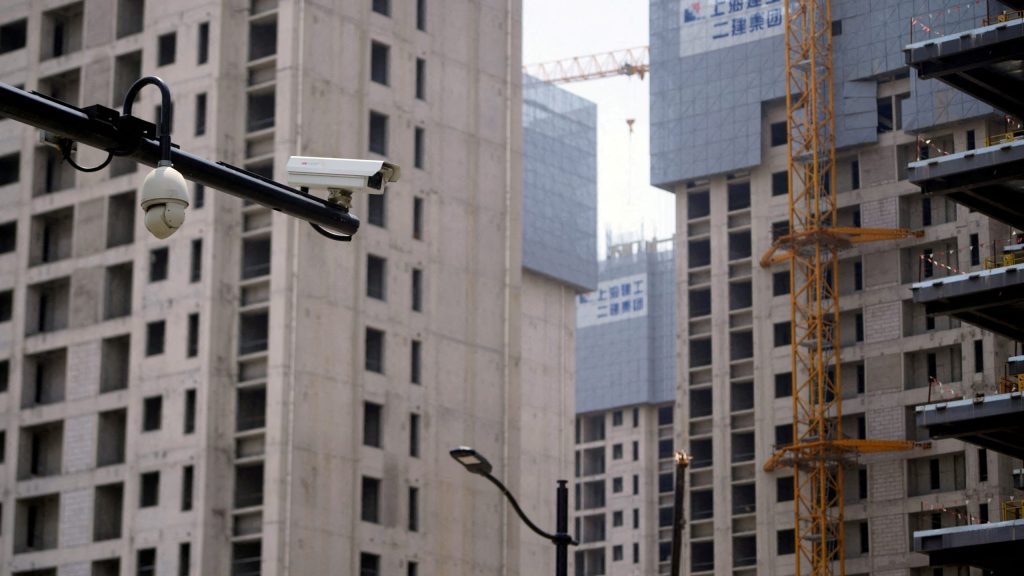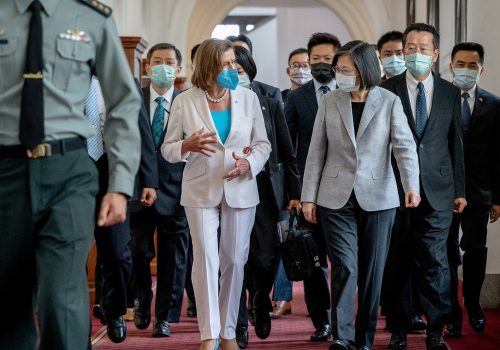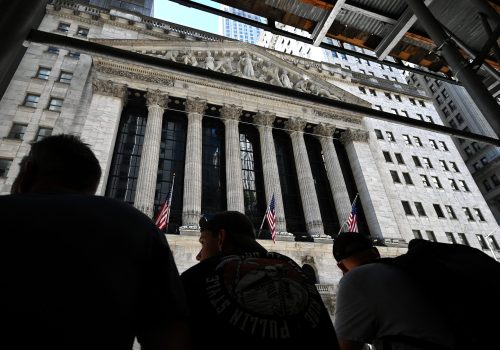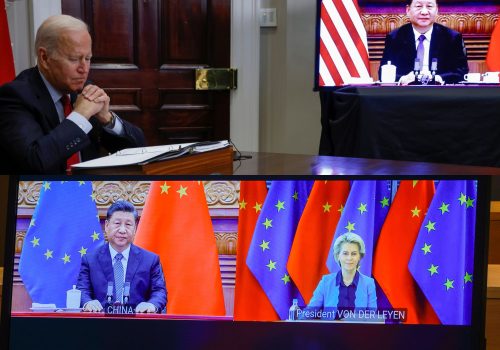As China’s Communist Party leaders gather on October 16 for their Twentieth Congress, one of the biggest policy challenges looming over the meeting will be the country’s rapidly metastasizing property downturn that threatens to engulf heavily indebted developers, homeowners, financial institutions, and local governments.
So far, party leaders have appeared hesitant to respond to the crisis with the kind of powerful financial resources that the central government has at its disposal to avoid a meltdown. Instead, they have adopted what one economist calls a “whack-a-mole” strategy of piecemeal bailouts. It’s unclear whether they’ll even tackle the issue head-on at the party congress, which is expected to focus on solidifying Xi’s rule with a third five-year term. Such an outcome would symbolize the victory of party politics over actual problem-solving.
The announcement of the congress trumpeted the concept of “Common Prosperity,” a long-forgotten Maoist nostrum that has been used to justify policies ranging from restraining “the disorderly expansion of capital” to cracking down on China’s high-tech titans. The party’s official view of home ownership, as viewed through this prism, is that “houses are for living in, not for speculation,” an idea that Xi voiced at the last congress in 2017. Property speculation is a major reason housing prices rose almost without pause from the 1990s until last year. By one estimate, only 20 percent of home purchases in 2018 were by people buying their first home; a decade earlier, 70 percent of buyers were first-timers.
China’s leaders cannot afford to give short shrift to this crisis. As the country faces the reality of a rapidly deflating asset bubble, the technocrats charged with controlling the situation will have a hard time avoiding a hard landing if they’re being guided by party orthodoxy instead of pragmatism. Property represents some 70 percent of the assets of China’s urban population, and those homeowners will not be happy if their middle-class status is undermined by a reassertion of politics over economics.
Economic anchor
It’s hard to overstate the importance of real estate for the Chinese economy. Property represents up to 30 percent of China’s GDP and some 25 percent of fixed investment and bank lending between 2015 and 2020. It has provided a crucial engine of growth for China and, by extension, the world economy since the global financial crisis of 2008.
But the buildup of property-related debt has become a threat to China’s economic and financial stability. Bloomberg estimates that the total exposure of China’s financial system to the property sector at the end of March was about $8.56 trillion, with more than three-quarters of that amount in mortgages. That debt includes substantial lending by shadow lending institutions operating in a regulatory gray zone. The International Monetary Fund calculates that 16-20 percent of real-estate investment was financed by trusts as of 2021. Moreover, bad-debt funds set up by Beijing to take over nonperforming loans during an earlier debt crisis, as well as financing vehicles controlled by local governments, have been major sources of financing and investment.
The chickens started coming home to roost in 2020, when Beijing imposed strict controls on bank lending to property developers based on debt parameters—called the ”three red lines” —which cut off the flow of easy money to many companies. By mid-2021, the property market began experiencing a sharp contraction, and Xi’s strict zero-COVID policy, which has shut down some of China’s largest cities for extended periods, then made matters worse by choking off consumer spending. House sales in China’s largest cities dropped for fourteen straight months through August, and prices fell for twelve months.
At least eighteen property developers have defaulted on nearly thirty billion dollars of dollar-denominated bonds traded in overseas markets over the past year, and several others have asked to delay payments. Some of the country’s largest private and state-owned property firms are unable to meet their financial obligations, a trend led by China Evergrande Group, a privately owned developer whose liabilities exceed three hundred billion dollars with hundreds of unfinished housing projects nationwide. Bad debt climbed to about 29 percent of property loans in the first half of 2022, Citi Group said in a recent report, and even state-owned developers are at risk of default.
The landscape of abandoned construction projects has trapped large numbers of homebuyers who pay in full for apartments—with cash and mortgages—before completion under widely used pre-sale arrangements. This is because developers have engaged in what amounts to a massive Ponzi scheme by investing pre-sale revenue in new projects instead of using that money to finish apartments.
In July, mortgage boycotts by purchasers waiting for unfinished apartments broke out in almost one hundred cities. Although government censors cracked down on social media posts and local governments promised relief, more than 340 developments were reported to have been hit by the boycotts by mid-September. It was just the most visible sign of emerging systemic distress.
A lack of action
As Chinese economic growth in the second quarter of 2022 fell to just 0.4 percent, the government appeared hesitant to employ the kind of firepower that other countries have brought to bear in response to their own bursting property bubbles. Instead, Beijing has put in place a series of interest-rate cuts and spending plans aimed at increasing infrastructure spending and providing loans and other resources to local governments to take over some non-performing loans and unfinished housing projects.
In July, Premier Li Keqiang announced that the government won’t “overdraw the future for an overly high growth target.” He may have been referring to the government’s unattainable goal of “around 5.5 percent growth” this year, but it provided little comfort to financial markets.
Beijing’s reflexive lack of transparency has only added to the uncertainty hanging over the crisis. For example, it’s unclear whether any significant steps have been taken to shore up or restructure insolvent companies like Evergrande, whose massive debts present a systemic threat.
Additional government actions to stabilize the property market have been announced in recent weeks, with one government newspaper reporting that some seventy-five cities have introduced measures to make buying apartments more attractive. More actions may be announced after the party congress. But an incremental response that shifts the responsibility to overstretched local governments only puts off the eventual day when Beijing will need to orchestrate expensive bailouts that shift vast amounts of bad debt onto central government balance sheets.
This leads some analysts to suggest the Chinese leadership is only putting off the day of reckoning. As Bert Hofman, former World Bank chief economist for East Asia, recently wrote, Beijing risks “perpetuating the misallocation of capital that has plagued China for years.”
That raises the question: What happens to the hundreds of millions of Chinese homeowners whose dreams of economic security are tied up in homes whose value is falling? As my Atlantic Council colleague Dexter Tiff Roberts has pointed out, Xi’s Common Prosperity envisions an “olive-shaped distribution” of wealth, with a large middle-class and small extremes of wealth and poverty. But if the leadership about to be anointed at the Communist Party Congress does not come to grips with the property crisis, Common Prosperity could end up resembling a broken egg.
Jeremy Mark is a senior fellow with the Atlantic Council‘s GeoEconomics Center. He previously worked for the International Monetary Fund and the Asian Wall Street Journal. Follow him on Twitter: @JedMark888.
Further reading
Wed, Aug 3, 2022
The coming aftershocks from Pelosi’s Taiwan trip
Fast Thinking By
With Pelosi now wheels-up from Taipei, what’s coming next in the US-China showdown? And how will the trip shake up life in Taiwan?
Tue, Aug 30, 2022
Deal or no deal, Chinese firms will still ditch Wall Street
New Atlanticist By Jeremy Mark
Despite a recent US-China agreement designed to end a decade-long auditing dispute, the era of Chinese firms' unfettered access to US equity markets is ending.
Thu, Jul 28, 2022
Cooperation with China: Challenges and opportunities
Report By Michael Schuman, David O. Shullman
Cooperation with China should focus on areas where our interests still align and where we can keep Beijing grounded in the international system. Like-minded allies and partners must pair such efforts with commitments to defend against China’s violations of international norms, impose costs on irresponsible behavior, and strengthen themselves and current global institutions to compete effectively and uphold liberal values.
Image: Surveillance cameras are seen near residential buildings under construction in Shanghai, China, on July 20, 2022. Photo by Aly Song/File Photo/REUTERS



